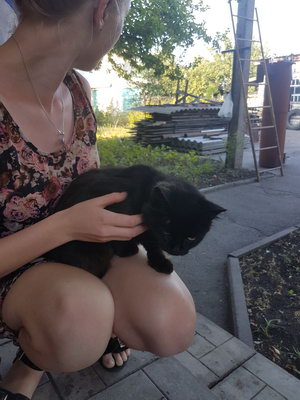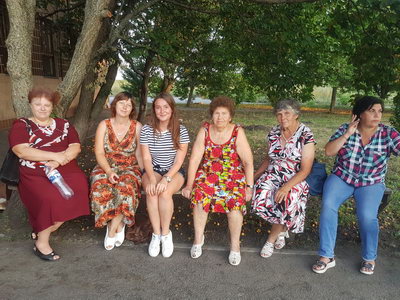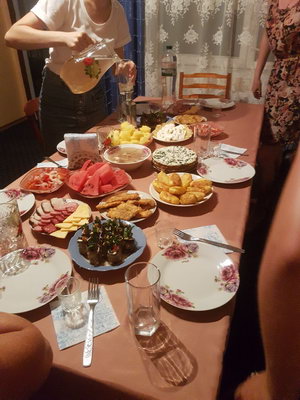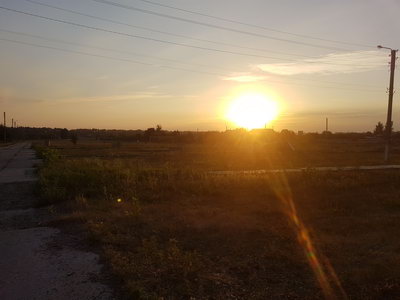Vilcha – the resettled village
(1-12 August 2017)
On the 26th April 1986, a global catastrophe happened in Ukraine. Everyone knows something about it, either from the reports or from news articles or from insipid horror films. Most of us permanently associate the accident on Chernobyl nuclear power plant with the town of Pripyat and huge Ferris wheel, which has never been launched. A ghost town appears before eyes and Chernobyl is associated with death, fear and horror. These terrible events and suffers undoubtedly couldn’t be erased out from the history, but in our project, we wanted to pay attention to a reverse side of this catastrophe, namely to those who are alive and their destinies.
The resettlement, loss of a home and, more importantly, loss of the Homeland are the central themes of our project.
 During the project, divided into pairs – one student was from Ukraine and one was from Germany- we interviewed the residents of this village. As a rule, the interviews were very emotional. We forced people to get back to the past with our questions. Their homes and their native places appeared before their eyes. They described forests, rivers, the smell of mushrooms and berries grown in their motherland before. Their grief was so perceptible. The tears rolled down their cheeks and we heard the repeated question not once: “Why didn’t they allow us to stay?” Homeland is not only a warm, safe home; it's a feeling of home. And although in New Vilcha the inhabitants have all the conditions for life, they just lack this feeling. The residents could accept this, they didn`t have another choice, so the villagers responded to our question about their life in Vilcha.
During the project, divided into pairs – one student was from Ukraine and one was from Germany- we interviewed the residents of this village. As a rule, the interviews were very emotional. We forced people to get back to the past with our questions. Their homes and their native places appeared before their eyes. They described forests, rivers, the smell of mushrooms and berries grown in their motherland before. Their grief was so perceptible. The tears rolled down their cheeks and we heard the repeated question not once: “Why didn’t they allow us to stay?” Homeland is not only a warm, safe home; it's a feeling of home. And although in New Vilcha the inhabitants have all the conditions for life, they just lack this feeling. The residents could accept this, they didn`t have another choice, so the villagers responded to our question about their life in Vilcha.
Vilcha residents are very kind and I should say that nowhere and never before I have not eaten as thoroughly and tasty as during these three days. They were very open and were ready to share everything with us. Sometimes it seemed to me that the sharing memories was something that residents of Vilcha had lacked. They wanted to be heard and tell their story. I remembered one woman. Shortly after our coming, she told us her story. She was very sincere, there were tears in her eyes, her pain and sufferings were perceptible. But when the next day we turned on a dictaphone, she closed, talked with restrain and told jokes instead of tragic events. At the interviewing training we had had in Kharkiv, we had been told that during the interview a person should not be interrupted, even if you felt that he was closing. I have made a conclusion for myself that some stories must be left only in our memory, not on the dictaphone. Another woman, on the contrary, shared her own story frankly, even before the camera. All the interviews were emotional and touching, and in the evenings at a dinner in the family that took me, my tears rolled down my cheeks. We have heard not fictitious novels I love to read, and not a Hollywood film, but the real stories of people who managed to take a place in my heart for such a short time. The h
tell their story. I remembered one woman. Shortly after our coming, she told us her story. She was very sincere, there were tears in her eyes, her pain and sufferings were perceptible. But when the next day we turned on a dictaphone, she closed, talked with restrain and told jokes instead of tragic events. At the interviewing training we had had in Kharkiv, we had been told that during the interview a person should not be interrupted, even if you felt that he was closing. I have made a conclusion for myself that some stories must be left only in our memory, not on the dictaphone. Another woman, on the contrary, shared her own story frankly, even before the camera. All the interviews were emotional and touching, and in the evenings at a dinner in the family that took me, my tears rolled down my cheeks. We have heard not fictitious novels I love to read, and not a Hollywood film, but the real stories of people who managed to take a place in my heart for such a short time. The h istory of this village will not leave anyone indifferent. These people want to be heard so that today we do not forget about what has happened.
istory of this village will not leave anyone indifferent. These people want to be heard so that today we do not forget about what has happened.
This project is a unique experience for me. In a few days, I met a beautiful country and people. People who are never spoken about. Together with the Ukrainian students and wonderful executives, we managed to realize this remarkable project in such a short time, the continuation of which is expected in March 2018 in Germany.
Vilcha numbers only 1,600 inhabitants, but they are united by a common story, namely the loss of the home.
